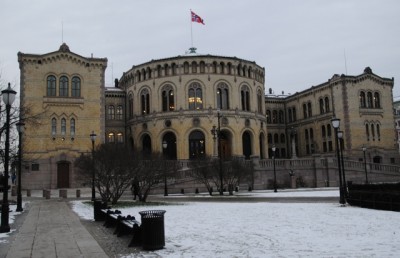Several recent government renovation contracts have ended up with subcontractors which have either been convicted or charged over links to money laundering networks. Police have been ordered to throw more resources into the pursuit of organized economic crime in the construction industry, but a report commissioned by the Police Directorate found Norwegian authorities are all but powerless when it comes to identifying and investigating money laundering cases.

One of Oslo’s biggest renovation companies, Malermester Harald Askautrud AS, has contracts with Public Construction (Statsbygg), Defence Construction (Forsvarsbygg) and several municipalities. Projects include renovations of Parliament (Stortinget), ministry buildings, museums, schools, nursing homes and public housing. Newspaper Aftenposten reported Malermester Harald Askautrud used five different contractors which have links to three money laundering networks. The company said it was unaware any of its subcontractors were involved in criminal networks.
“Money laundering and labour crime are some of the biggest social challenges we have today,” said Gro Smogeli, the acting chief of Oslo police. “We see that it’s happening more and more often. Especially in the construction industry, there’s a lot of money involved. It trades in hundreds of millions annually, and there can be illegality and laundering in this industry.” Police believe the black labour market is a superstructure for crime including social dumping, falsification of identities, financial crime and human trafficking.
Smogeli was concerned about the overlap between the “white, black and grey” markets. “We see that firms can both engage in real work, while at the same time using fake subcontractors in “empty” companies, where no one works, but are used by the companies to pay the workers who work illegally for the subcontractor and launder money,” she told Aftenposten.
Links to criminal networks
Select Bygg AS was awarded the subcontract to paint the facade of the Ministry of Defence (Forsvarsdepartementet), despite the company holder being caught for operating with illegal labour and charged for tax fraud and handling stolen goods. The holder of Aktiv Maler Service AS was also charged over serious crimes, but won a subcontract to work on the ministry renovations as well. It pulled out citing lack of capacity.
Police listed both companies among 35 people and business linked to the Albanian “Zvonko network,” which authorities believed laundered NOK 40 million (USD 6.6 million). The lawyer representing Select Bygg and Aktiv Bygg, René Ibsen, told Aftenposten his clients deny guilt, and have been made liable for tax evasion committed by others.
Other contractors used by Malermester Harald Askautrud included AB Murpuss, which tax authorities accused of paying illegal wages, tax fraud and fictitious billing in connection with the “Fino network.” The holder denied running an illegal operation, and said the invoices he received from Fino Bygg were real. The holders of Lagos Mal Consult and Donat Ren-Maler, two other Askautrud contractors, were imprisoned in 2010 for crimes including laundering and handling stolen goods.
No suspicions
“We see of course that there are some who struggle to keep track of their business in the construction industry, but that someone in our circle would form part of the criminal network, was news to us,” said Odd Christian Danbolt, the finance manager at Malermester Harald Askautrud.
“We have had good controls, but obviously not good enough. We develop the controls constantly. We can no longer trust what they say when new subcontractors come to us,” said manager and principal owner Marius Bergtrøm. The company leaders said they had no idea about the police investigation, tax claims and charges.
Askautrud checked tax and VAT certificates, incorporation certificates, construction certifications and insurance. “The big companies have used these subcontractors more than us, and we know they have strong control routines when they take people into the construction site,” said Berstrøm. “For us, it was satisfactory.”
Police unable to identify and investigate
Meanwhile, a report commissioned by the Police Directorate (Politidirektoratet) found Norwegian police and prosecutors focus on petty crimes and drug crimes when investigating money laundering, and do not pay enough attention to economic crime, reported news bureau NTB.
Swedish law professor Dan Magnusson analysed all the money laundering and illegal goods handling cases closed under the Oslo police district in 2012. “The results of the survey suggest that the tax authorities, trustees in bankruptcy, the prosecution and the police are unable to identify and investigate money laundering,” Magnusson said. “Neither does the court seem to have an ambition to raise money laundering as a crime that should have a general deterrent effect.”
Norway has comparatively few money laundering cases. Part of Magnusson’s brief was to identify if cases had been wrongly classified, skewing the results. His report showed both illegal handling of goods cases misclassified as money laundering, and vice versa, but was most concerned by the fact most cases related to drug crime, not the economic organized crime the legislation is aimed at combatting.
“We are not satisfied with the conclusions the report reaches about a lack of effort in the area of money laundering,” said Torgeir Magnussen, an inspector with the Police Directorate. “It is remarkable that he did not find money laundering in economic crime in the material he has gone through.”
The report covered a third of the criminal handling and money laundering cases in Norway, but excluded cases investigated by the national economic crime unit Økokrim. Magnussen said the directorate will ask the Police University College (Politihøgskolen) to do a similar investigation at Økokrim.
newsinenglish.no/Emily Woodgate

